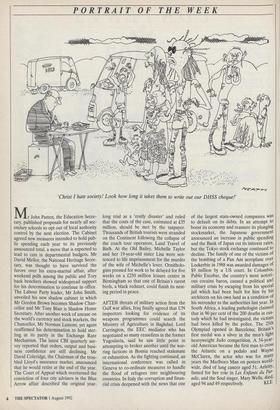PORTRAIT OF THE WEEK
`Christ I hate society! Look how long it takes them to write out our DHSS cheque!'
Mr John Patten, the Education Secre- tary, published proposals for nearly all sec- ondary schools to opt out of local authority control by the next election. The Cabinet agreed new measures intended to hold pub- lic spending each year to its previously announced total, a move that is expected to lead to cuts in departmental budgets. Mr David Mellor, the National Heritage Secre- tary, was thought to have survived the furore over his extra-marital affair, after weekend polls among the public and Tory back benchers showed widespread support for his determination to continue in office. The Labour Party leader, Mr John Smith, unveiled his new shadow cabinet in which Mr Gordon Brown becomes Shadow Chan- cellor and Mr Tony Blair is Shadow Home Secretary. After another week of unease on the world's currency and stock markets, the Chancellor, Mr Norman Lamont, yet again reaffirmed his determination to hold ster- ling at its parity in the Exchange Rate Mechanism. The latest CBI quarterly sur- vey reported that orders, output and busi- ness confidence are still declining. Mr David Coleridge, the Chairman of the trou- bled Lloyd's insurance market, announced that he would retire at the end of the year. The Court of Appeal which overturned the conviction of four city advisers in the Blue Arrow affair described the original year-
long trial as a 'costly disaster' and ruled that the costs of the case, estimated at £35 million, should be met by the taxpayer. Thousands of British tourists were stranded on the Continent following the collapse of the coach tour operators, Land Travel of Bath. At the Old Bailey, Michelle Taylor and her 19-year-old sister Lisa were sen- tenced to life imprisonment for the murder of the wife of Michelle's lover. Ornitholo- gists pressed for work to be delayed for five weeks on a £250 million leisure centre in Birmingham so that one of Britain's rarest birds, a black redstart, could finish its nest- ing period in peace.
AFTER threats of military action from the Gulf war allies, Iraq finally agreed that UN inspectors looking for evidence of its weapons programmes could search the Ministry of Agriculture in Baghdad. Lord Carrington, the EEC mediator who has negotiated so many ceasefires in the former Yugoslavia, said he saw little point in attempting to broker another until the war- ring factions in Bosnia reached stalemate or exhaustion. As the fighting continued, an international conference was called in Geneva to co-ordinate measures to handle the flood of refugees into neighbouring countries. In Italy the corruption and finan- cial crisis deepened with the news that one
of the largest state-owned companies was to default on its debts. In an attempt to boost its economy and reassure its plunging stockmarket, the Japanese government announced an increase in public spending and the Bank of Japan cut its interest rates, but the Tokyo stock exchange continued to decline. The family of one of the victims of the bombing of a Pan Am aeroplane over Lockerbie in 1988 was awarded damages of $9 million by a US court. In Colombia, Pablo Escobar, the country's most notori- ous cocaine baron, caused a political and military crisis by escaping from his special jail which had been built for him by his architects on his own land as a condition of his surrender to the authorities last year. In South Africa, a leading pathologist claimed that in 90 per cent of the 200 deaths in cus- tody which he had investigated, the victims had been killed by the police. The 25th Olympiad opened in Barcelona; Britain's first medal was a silver in the men's light heavyweight Judo competition. A 34-year- old American became the first man to cross the Atlantic on a pedalo and Wayne McClaren, the actor who was for many years the Marlboro Man on posters world- wide, died of lung cancer aged 51. Arletty, famed for her role in Les Enfants du Par- adis, and the Soul singer, Mary Wells, died,
aged 94 and 49 respectively. KLE


















































 Previous page
Previous page